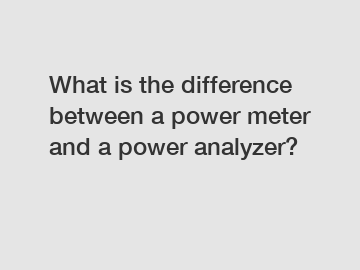Feb. 05, 2024
Measurement & Analysis Instruments
SUIN Product Page
What is the difference between a power meter and a power analyzer? This is a commonly asked question among those who work with electricity. While both devices are used to measure electrical power, there are distinct differences between them in terms of functionality and application.
A power meter is a device that is primarily used to measure the amount of electrical power consumed by an electrical load. It provides users with readings of variables such as voltage, current, power factor, and energy consumption. Power meters are commonly used in various settings, including residential, commercial, and industrial applications. They are essential for monitoring energy usage, analyzing power quality, and optimizing energy efficiency.

On the other hand, a power analyzer represents a more advanced instrument that not only measures electrical power but also provides detailed analysis and characterization of electrical systems. It offers users a complete picture of power quality, including waveform analysis, harmonic analysis, and transient analysis. In addition to the basic measurements provided by a power meter, a power analyzer enables in-depth analysis of electrical parameters such as total harmonic distortion, crest factor, power factor correction, and power quality indices.
Suggested reading:The need for both devices arises from the different level of detail required for power measurement and analysis. A power meter is suitable for general energy monitoring purposes, where the main objective is to obtain the consumption data for billing or energy management purposes. It provides basic information, such as the total energy consumed and average power factor, which is sufficient for most applications.
On the other hand, a power analyzer is indispensable when more comprehensive information is needed to diagnose and troubleshoot power-related issues. For instance, in industrial settings, where power quality issues can lead to equipment damage, a power analyzer is essential to identify and resolve problems such as voltage sags, harmonic distortion, or transient voltage spikes. By providing detailed analysis, a power analyzer helps engineers and electricians to pinpoint and mitigate power quality problems, ensuring efficient and reliable operation of electrical systems.
In conclusion, while both a power meter and a power analyzer are used to measure electrical power, there are significant differences in functionality and application. A power meter primarily provides basic measurements of energy consumption, voltage, current, and power factor, whereas a power analyzer offers advanced analysis and characterization of electrical systems. The choice between the two devices depends on the level of detail required for power measurement and analysis, with a power analyzer being necessary in situations where in-depth analysis and troubleshooting are crucial. Understanding these differences allows professionals to select the most appropriate instrument for their specific needs and enhance the efficiency and reliability of their electrical systems.
Click here to get more.
Want more information on Portable Power Quality Meter? Feel free to contact us.
Suggested reading:Previous: Which 11digits/S Universal Frequency Counter is worth purchasing?
Next: Power Quality Analyzer Prices: Unveiling the Best Deals for Accurate Analysis & Maximum Savings
If you are interested in sending in a Guest Blogger Submission,welcome to write for us!
All Comments ( 0 )